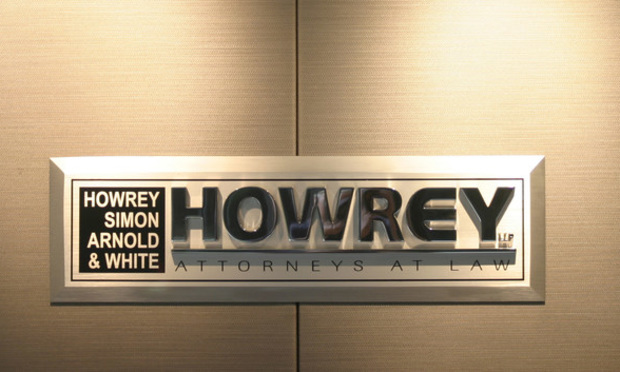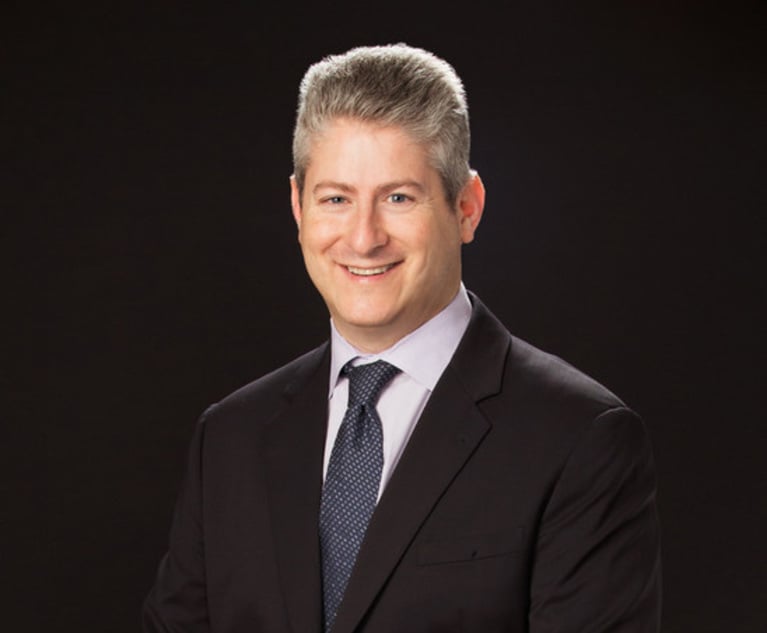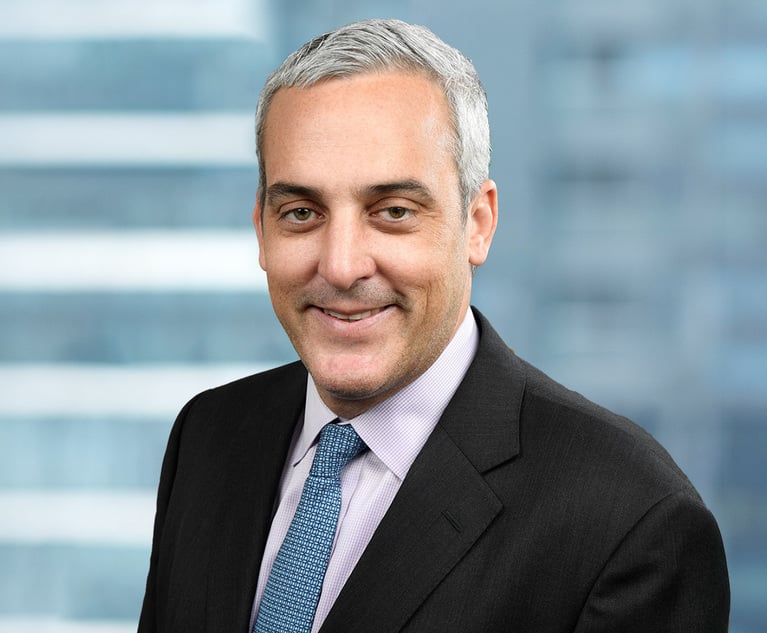Big Law Firms Urge DC Court to Reject 'Unfinished Business' in Howrey Bankruptcy
A D.C. appeals court is looking at the "unfinished business" doctrine after Howrey's bankruptcy trustee sued several law firms, saying the defunct firm is entitled to fees from matters that departed partners brought with them to their new firms.
December 17, 2018 at 04:32 PM
5 minute read

Weighing a key issue in the bankruptcy of the now-defunct law firm Howrey, a Washington, D.C., appeals court on Monday grappled with competing views on whether dissolved law firms can claim a portion of hourly fees from matters that departed partners brought to a new firm.
A panel at the District of Columbia Court of Appeals—comprised of Chief Judge Anna Blackburne-Rigsby, Associate Judge Corinne Beckwith and Senior Judge Vanessa Ruiz—heard oral arguments pitting Howrey's bankruptcy trustee, Allan Diamond, against several large law firms that hired former Howrey partners around the time of the firm's dissolution in 2011.
Monday's arguments focused on the so-called unfinished business doctrine, the idea that a defunct law firm's bills for ongoing matters qualify as assets for the bankrupt firm that can, in turn, be used to repay creditors.
The D.C. appeals court is looking at the issue after the U.S. Court of Appeals for the Ninth Circuit certified three questions in an underlying case, in which Howrey's bankruptcy trustee sued the law firms in California federal court. The trustee is looking to recover profits from hourly cases that started at Howrey before its dissolution in 2011 but were completed after partners had moved on to new law firms. The Ninth Circuit asked for input on the case because Howrey's partnership was subject to D.C. law.
Arguing for the Howrey trustee on Monday, Christopher Sullivan of Diamond McCarthy urged the D.C. appeals court to adopt the view that a law firm's bankruptcy estate holds onto a property interest in client matters that were pending when a law firm dissolved. That interest continues “for the life of the matter,” said Sullivan, meaning that Howrey's estate deserves a cut of profits from matters that partners took with them when they left the now-defunct firm.
“The hourly engagements are the primary assets of the firm and they need to be protected,” Sullivan said. “When the firm is in dissolution and capital can't be returned to partners, then it's the liability of the creditors that has to be satisfied first.”
Jones Day's Shay Dvoretzky, arguing for his firm and other defendants, including Hogan Lovells, Kasowitz Benson Torres, and Sheppard, Mullin, Richter & Hampton, took an opposing view. He told the D.C. appellate judges that a client matter belongs to the client.
Even though modern-day law firms make investments in establishing client relationships that they hope will secure a given matter and future work down the road, legal ethics rules dictate that clients are ultimately in charge and can choose to take their work elsewhere, said Dvoretzky.
“The partner doesn't transfer the matter; the client is making the choice,” he said.
That dynamic, he added, makes a law firm's initial investment into establishing relationships one of the firm's expenses, more akin to overhead than an asset. So while a firm might account for startup costs when setting its hourly rates for a given client matter, the firm is only entitled to those hourly fees for legal work it actually provides on the matter, according to Dvoretzky.
“The core principle is that the firm has a right to be paid for the work that it did,” Dvoretzky said. He added, however, that, once “a firm has been paid for the work that it does, it has no further property interest.”
Other state appeals courts have ruled on unfinished business questions in connection with other law firm bankruptcies. In March, the California Supreme Court ruled against the bankruptcy trustee for Heller Ehrman, finding that dissolved firms are not entitled to a portion of unfinished hourly fee matters that departing partners take with them.
The California ruling was in line with a New York Court of Appeals decision that arose out of the bankruptcies of Thelen and Coudert Brothers. The New York court decided in 2014 that firms don't have ownership of client matters and that lawyers are entitled only to fees they earn from working on a specific matter.
All of the unfinished business doctrine cases have been closely watched among many in the legal community. At the D.C. appeals court, the law firms looking to fend off claims for unfinished business have received a spate of outside support in the form of amicus briefs. One of those came from the American Bar Association, which in July told the appeals court that the Howrey trustee's position was “flatly inconsistent” with legal ethics rules that emphasize client choice.
Read More:
'Unfinished Business' Claims Zapped by California Supreme Court in Heller Case
The Death of the Law Firm Bankruptcy?
Ninth Circuit Routes 'Unfinished Business' Question in Howrey Bankruptcy to DC Court of Appeals
This content has been archived. It is available through our partners, LexisNexis® and Bloomberg Law.
To view this content, please continue to their sites.
Not a Lexis Subscriber?
Subscribe Now
Not a Bloomberg Law Subscriber?
Subscribe Now
NOT FOR REPRINT
© 2025 ALM Global, LLC, All Rights Reserved. Request academic re-use from www.copyright.com. All other uses, submit a request to [email protected]. For more information visit Asset & Logo Licensing.
You Might Like
View All

Cooley Promotes NY Office Leader to Global Litigation Department Chair

Big Law Partner Co-Launches Startup Aiming to Transform Fund Formation Process
5 minute read
Latham Adds Former Treasury Department Lawyer for Cross-Border Deal Guidance
2 minute readTrending Stories
- 1Public Notices/Calendars
- 2Wednesday Newspaper
- 3Decision of the Day: Qui Tam Relators Do Not Plausibly Claim Firm Avoided Tax Obligations Through Visa Applications, Circuit Finds
- 4Judicial Ethics Opinion 24-116
- 5Big Law Firms Sheppard Mullin, Morgan Lewis and Baker Botts Add Partners in Houston
Who Got The Work
J. Brugh Lower of Gibbons has entered an appearance for industrial equipment supplier Devco Corporation in a pending trademark infringement lawsuit. The suit, accusing the defendant of selling knock-off Graco products, was filed Dec. 18 in New Jersey District Court by Rivkin Radler on behalf of Graco Inc. and Graco Minnesota. The case, assigned to U.S. District Judge Zahid N. Quraishi, is 3:24-cv-11294, Graco Inc. et al v. Devco Corporation.
Who Got The Work
Rebecca Maller-Stein and Kent A. Yalowitz of Arnold & Porter Kaye Scholer have entered their appearances for Hanaco Venture Capital and its executives, Lior Prosor and David Frankel, in a pending securities lawsuit. The action, filed on Dec. 24 in New York Southern District Court by Zell, Aron & Co. on behalf of Goldeneye Advisors, accuses the defendants of negligently and fraudulently managing the plaintiff's $1 million investment. The case, assigned to U.S. District Judge Vernon S. Broderick, is 1:24-cv-09918, Goldeneye Advisors, LLC v. Hanaco Venture Capital, Ltd. et al.
Who Got The Work
Attorneys from A&O Shearman has stepped in as defense counsel for Toronto-Dominion Bank and other defendants in a pending securities class action. The suit, filed Dec. 11 in New York Southern District Court by Bleichmar Fonti & Auld, accuses the defendants of concealing the bank's 'pervasive' deficiencies in regards to its compliance with the Bank Secrecy Act and the quality of its anti-money laundering controls. The case, assigned to U.S. District Judge Arun Subramanian, is 1:24-cv-09445, Gonzalez v. The Toronto-Dominion Bank et al.
Who Got The Work
Crown Castle International, a Pennsylvania company providing shared communications infrastructure, has turned to Luke D. Wolf of Gordon Rees Scully Mansukhani to fend off a pending breach-of-contract lawsuit. The court action, filed Nov. 25 in Michigan Eastern District Court by Hooper Hathaway PC on behalf of The Town Residences LLC, accuses Crown Castle of failing to transfer approximately $30,000 in utility payments from T-Mobile in breach of a roof-top lease and assignment agreement. The case, assigned to U.S. District Judge Susan K. Declercq, is 2:24-cv-13131, The Town Residences LLC v. T-Mobile US, Inc. et al.
Who Got The Work
Wilfred P. Coronato and Daniel M. Schwartz of McCarter & English have stepped in as defense counsel to Electrolux Home Products Inc. in a pending product liability lawsuit. The court action, filed Nov. 26 in New York Eastern District Court by Poulos Lopiccolo PC and Nagel Rice LLP on behalf of David Stern, alleges that the defendant's refrigerators’ drawers and shelving repeatedly break and fall apart within months after purchase. The case, assigned to U.S. District Judge Joan M. Azrack, is 2:24-cv-08204, Stern v. Electrolux Home Products, Inc.
Featured Firms
Law Offices of Gary Martin Hays & Associates, P.C.
(470) 294-1674
Law Offices of Mark E. Salomone
(857) 444-6468
Smith & Hassler
(713) 739-1250










